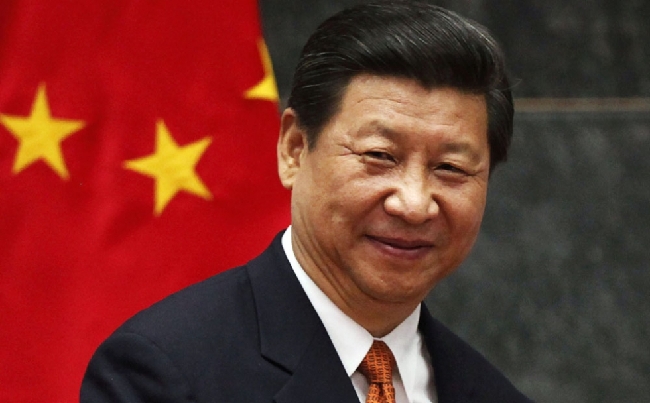當(dāng)前位置: Language Tips> 權(quán)威發(fā)布
分享到

Ahead of his first official state visit to the U.S., Chinese President Xi Jinping provided written answers to questions submitted by The Wall Street Journal. Here is the full transcript:
中國(guó)國(guó)家主席習(xí)近平在啟程對(duì)美國(guó)進(jìn)行官方國(guó)事訪問前接受了《華爾街日?qǐng)?bào)》的書面采訪,這是習(xí)近平就任國(guó)家主席以來首次對(duì)美進(jìn)行國(guó)事訪問。以下是書面采訪全文:
1. Under your leadership, China has been active in promoting new economic and security arrangements. The Asian Infrastructure Investment Bank, in particular, has been a notable achievement. Is China trying to rearrange the architecture of global governance, away from the U.S. and toward China?
《華爾街日?qǐng)?bào)》:在您的領(lǐng)導(dǎo)下,中國(guó)在推動(dòng)新的經(jīng)濟(jì)和安全安排方面表現(xiàn)得十分活躍,尤其是亞洲基礎(chǔ)設(shè)施投資銀行更是取得明顯進(jìn)展。中國(guó)是否正在有意將此前以美國(guó)為主的全球治理結(jié)構(gòu)加以調(diào)整使其更向中國(guó)傾斜?
XI: The global governance system is built and shared by the world, not monopolized by a single country. China certainly has no intention to do so. China is involved in building the current international system, and has always done its part to uphold the international order and system with the U.N. as its core and the purposes and principles of the U.N. charter as its foundation.
習(xí)近平:全球治理體系是由全球共建共享的,不可能由哪一個(gè)國(guó)家獨(dú)自掌握。中國(guó)沒有這種想法,也不會(huì)這樣做。中國(guó)是現(xiàn)行國(guó)際體系的參與者、建設(shè)者、貢獻(xiàn)者,一直維護(hù)以聯(lián)合國(guó)為核心、以聯(lián)合國(guó)憲章宗旨和原則為基礎(chǔ)的國(guó)際秩序和國(guó)際體系。
Many visionary people hold that as the global landscape evolves and major transnational and global challenges facing mankind increase, it is necessary to adjust and reform the global governance system and mechanism. Such reform is not about dismantling the existing system and creating a new one to replace it. Rather, it aims to improve the global governance system in an innovative way. We in China have a saying, “When all means are exhausted, changes are necessary; once changes are made, things will improve.” Whether for a country or the entire world, adaptation to keep pace with the times is necessary in order to maintain its vigor. To build a more equitable, just and effective architecture of global governance meets the common aspiration of all countries. China and the U.S. share broad interests in this respect and should work together to improve the global governance system. This will not only leverage our respective strengths to enhance cooperation, but also enable our two countries to jointly respond to major challenges facing mankind.
世界上很多有識(shí)之士都認(rèn)為,隨著世界不斷發(fā)展變化,隨著人類面臨的重大跨國(guó)性和全球性挑戰(zhàn)日益增多,有必要對(duì)全球治理體制機(jī)制進(jìn)行相應(yīng)的調(diào)整改革。這種改革并不是推倒重來,也不是另起爐灶,而是創(chuàng)新完善。“窮則變,變則通。”無論是一個(gè)國(guó)家,還是世界,都需要與時(shí)俱進(jìn),這樣才能保持活力。推動(dòng)全球治理體系朝著更加公正合理有效的方向發(fā)展,符合世界各國(guó)的普遍需求。中美在全球治理領(lǐng)域有著廣泛共同利益,應(yīng)該共同推動(dòng)完善全球治理體系。這不僅有利于雙方發(fā)揮各自優(yōu)勢(shì)、加強(qiáng)合作,也有利于雙方合作推動(dòng)解決人類面臨的重大挑戰(zhàn)。
China owes much of its progress in development over the past decades to international cooperation; we thus feel duty-bound to make greater contribution to international development endeavors. Many other developing countries have also expressed similar strong wishes to China. The Asian Infrastructure Development Bank (AIIB) is established mainly as a response to the need of Asian countries for infrastructure development and their aspirations for further cooperation. According to the projection of the World Bank and the Asian Development Bank, from 2010 to 2020, the annual shortfall in funding for Asian infrastructural development is around US$800 billion. The AIIB serves as a new option to meet this shortfall, and it is therefore welcomed by both Asian countries and the wider international community. But as the funding shortage is huge, it is clear that the AIIB alone cannot possibly meet such demand. As an open and inclusive multilateral development agency, the AIIB will complement other multilateral development banks. In addition to Asian countries, countries outside Asia such as Germany, France and the U.K. have also joined the AIIB. China welcomes the U.S. to join the AIIB. This has been our position from the very outset.
中國(guó)幾十年的發(fā)展很大程度上得益于國(guó)際合作。因此,我們應(yīng)該為國(guó)際發(fā)展事業(yè)作出貢獻(xiàn),很多發(fā)展中國(guó)家朋友對(duì)中國(guó)提出了這方面的強(qiáng)烈愿望。建立亞投行,主要是為滿足亞洲地區(qū)基礎(chǔ)設(shè)施建設(shè)的需求以及亞洲各國(guó)在深化合作方面的愿望。據(jù)世行、亞開行測(cè)算,2010年到2020年,亞洲地區(qū)每年基礎(chǔ)設(shè)施建設(shè)資金缺口達(dá)8000億美元。亞投行可以為這種需求多提供一種資金投入選擇,因而受到亞洲國(guó)家和國(guó)際社會(huì)歡迎。面對(duì)這么大的需求,亞投行只是一個(gè)渠道,不可能包打天下。亞投行是一個(gè)開放和包容的多邊開發(fā)機(jī)構(gòu),將同現(xiàn)有多邊開發(fā)銀行相互補(bǔ)充。除了域內(nèi)國(guó)家,德國(guó)、法國(guó)、英國(guó)等國(guó)家也都加入了亞投行。中方歡迎美國(guó)參與亞投行,從一開始我們就是這個(gè)態(tài)度。
I don't believe any country is capable of rearranging the architecture of global governance toward itself. Obviously, such practice goes against the trend of the times. The improvement of global governance architecture should be decided by all countries. As the U.N. summit commemorating the 70th anniversary draws nearer, China stands ready to work with all the other U.N. member states to build a new type of international relationship featuring win-win cooperation, improve the architecture of global governance, and build a community of shared future for mankind.
我不認(rèn)為世界上哪個(gè)國(guó)家可以使全球治理結(jié)構(gòu)向自己傾斜,也不認(rèn)為這樣做是符合時(shí)代潮流的。全球治理結(jié)構(gòu)如何完善,應(yīng)該由各國(guó)共同來決定。聯(lián)合國(guó)馬上就要舉行成立70周年系列峰會(huì)。中國(guó)愿同廣大成員國(guó)一道,推動(dòng)建設(shè)以合作共贏為核心的新型國(guó)際關(guān)系,完善全球治理結(jié)構(gòu),共同構(gòu)建人類命運(yùn)共同體。
分享到
關(guān)注和訂閱

關(guān)于我們 | 聯(lián)系方式 | 招聘信息
電話:8610-84883645
傳真:8610-84883500
Email: languagetips@chinadaily.com.cn